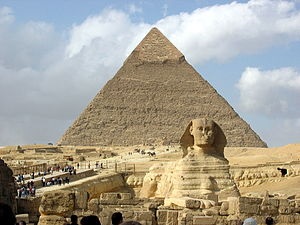|
|
| |
|
|
| |
|
|
|
|
| |
 |
| Ancient Egypt
provides a canonical example of an early culture
considered a civilization. |
Civilizations
Civilization (or civilisation) comes from the Latin word
civis meaning someone who lives in a town. When people
are civilised, they live in large well-organized groups
like towns, not in small tribes or isolated family
groups.
However, a civilization is something more than a town.
It is an advanced stage of organisation. That means it
has laws, culture, a regular way of getting food and
protecting the people. Most civilizations have
agriculture, and a system of government like monarchs or
elections. They speak a common language, and usually
have a religion of some kind. They teach their young the
knowledge they need. All civilizations since the
Sumerians and the Egyptians have some kind of writing.
Writing lets people store and build up knowledge.
The Roman Empire is an example of a large civilization.
It was governed from Rome. This empire once stretched
from the Scottish borders to North Africa and the
eastern Mediterranean. They had their own language,
Latin. |
|
Latin became the preferred method of communication among
educated people until long after their civilization had
vanished. Today lawyers and politicians, doctors and
scientists, scholars and others still use Latin in the
course of their everyday work, even though the Roman
civilization died out more than 1,500 years ago. It is
said that William Shakespeare excelled at Latin. Latin
is still taught in some schools. We still admire and
copy Roman architecture, use Roman numerals to count
certain things, use the names of Roman gods to mark the
days and months of our calendars, name the
constellations in the sky by the same names that the
Romans used and we model our Western political
constitutions and structures on Roman models (Senate,
Governor, election, tribunal, justice, vote, census,
even the word Constitution, are all Latin words, their
meaning unchanged in thousands of years).
The Roman civilization lasted almost 1000 years, but the
Ancient Egyptian civilization was older and lasted
longer. The Romans and Egyptians fought each other in
the Battle of Actium. Rome won, and Egypt became part of
the Roman Empire. |
|
|
Examples of civilizations |
- The Acropolis in Greece, directly
influencing architecture and engineering in Western,
Islamic and Eastern civilizations up to the present day,
2400 years after construction
- The Temples of Baalbek in Lebanon
show us the religious and architectural styles of some
of the world's most influential civilizations including
the Phoenicians, Babylonians, Persians, Greeks, Romans,
Byzantines and Arabs
- The Roman Forum in Rome, Italy, the
political, economic, cultural and religious centre of
the Ancient Rome civilization, during the Republic and
later Empire, its ruins still visible today in
modern-day Rome
- While the Great Wall of China was
built to protect Ancient Chinese states and empires
against the raids and invasions of nomadic groups, over
thousands of years the region of China was also home to
many influential civilizations
- Virupaksha temple at Hampi in India.
The region of India has been home to major religions
such as Hinduism, Buddhism, Jainism and Sikhism and has
influenced other cultures and civilizations,
particularly in Southeast Asia.
- Ancient Egypt is a canonical example
of an early culture considered a civilization.
|
|
|
Dictionary definitions |
- An advanced state of intellectual,
cultural, and material development in human society,
marked by progress in the arts and sciences, an advanced
state of moral conduct, the extensive use of
record-keeping, including writing, and the appearance of
complex political and social institutions.
- The type of culture and society
developed by a particular nation or region or in a
particular epoch: Maya civilization; the civilization of
ancient Rome.
- The act or process of civilizing or
reaching a civilized state.
- Cultural or intellectual refinement;
good taste.
- Modern society with its
conveniences: "We returned to civilization after camping
in the mountains".
|
 Kiddle: Civilizations Kiddle: Civilizations
Wikipedia: Civilizations |
|
|
|
|
|
|
|
|
|
|
|
|
|
|
|
|
Search Fun Easy English |
|
|
|
|
|
|
|
|
|
|
|
|
|
|
|
About
Contact
Copyright
Resources
Site Map |